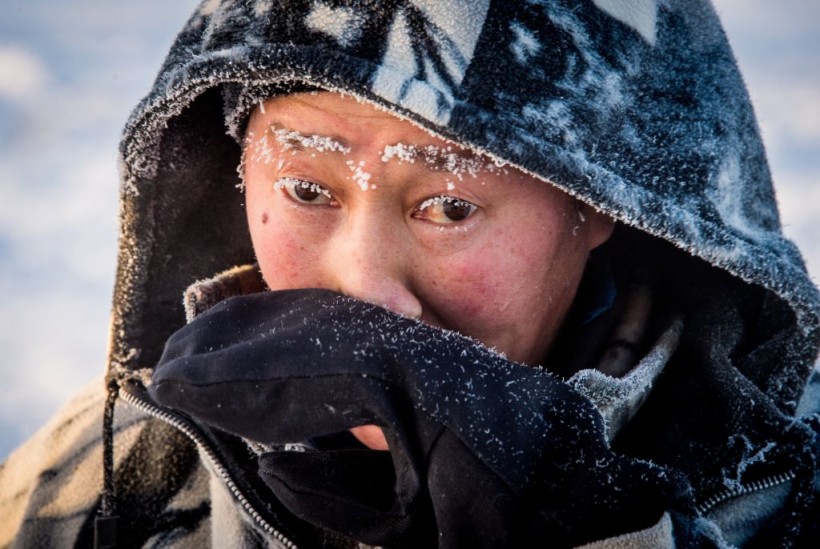Earth's extreme cold varies from the South Pole to the Arctic Circle, with record-breaking temperatures. While Earth's average temperature ranges from -13°F (-25°C) to 113°F (45°C), significant temperature extremes exist. Check out some of the coldest recorded temperatures on Earth, including locations and contrasts with temperatures on Mercury.

Villagers harvest ice from a local lake near the settlement of Oy, some 70 km south of Yakutsk, with the air temperature at about minus 41 degrees Celsius, on November 27, 2018.
Coldest Place on Earth
The East Antarctic Plateau in Antarctica is the coldest place on Earth, with temperatures dropping to as low as -144°F (-98°C). Researchers discovered this by reanalyzing satellite data from a ridge on the Antarctic Ice sheet that had previously reached -135°F (-93°C), but their new analysis revealed even colder temperatures.
Clear conditions and extremely dry air were identified as factors contributing to these frigid temperatures, as moisture can trap heat in the air. These conditions must persist for several days for temperatures to reach -144°F, and it's considered the limit for how cold it can get on Earth's surface.
Before the East Antarctic Plateau set the record for the coldest temperature on August 10, 2010, the Vostok Research Station in Antarctica held the record, with temperatures plunging to -128.6°F (-89.2°C) for ten days during the southern hemisphere summer on July 21, 1983.
The extremely low temperatures at Vostok were a result of specific climate conditions, including a mass of cold air preventing the mixing of warmer air from the Southern Ocean and a lack of cloud cover, which would have trapped heat. Researchers suggested that under the right conditions, Vostok Station could potentially reach even colder temperatures, with a record low of -140.8°F (-96°C).
READ ALSO: Curious Case of Absolute Zero: Unraveling the Enigma of the Coldest Temperature
Coldest Permanently Inhabited Place on Earth
Oymyakon in eastern Siberia is renowned as the coldest permanently inhabited place on Earth, with average winter temperatures plummeting to -58°F (-50°C). The village's name, "Oymyakon," translates to "water that doesn't freeze" due to a nearby thermal spring. Oymyakon was historically a destination for reindeer herders who brought their herds to the spring for water. The lowest recorded temperature in Oymyakon was a bone-chilling -96.2°F (-71.2°C) in 1924.
Meanwhile, the city of Yakutsk in Russia is recognized as the world's coldest city, experiencing frigid temperatures, with a recent record low of -80°F (-62.2°C) on January 18, 2023, the coldest in nearly two decades. Yakutsk is located just 280 miles (450 km) south of the Arctic Circle and is the largest city built on permanently frozen soil, or permafrost.
The city's lowest recorded temperature dates back to February 25, 1891, when it reached an astonishing minus 83.92°F (minus 64.4°C). In the winter, Yakutsk is often enveloped in an icy "habitation" fog due to the inability of hot air from people, cars, and buildings to rise in cold conditions.
The residents of these extremely cold regions cope with the frigid weather by layering their clothing. As one local resident advised, "Just dress warmly. In layers, like a cabbage."
Coldest Temperature Recorded in the Northern Hemisphere
The lowest temperature ever recorded in the northern hemisphere was documented on December 22, 1991, at the Klinck weather station, located in the middle of the Greenland ice sheet in the Arctic Circle. The temperature dropped to a bone-chilling -93.3°F (-69.6°C) at an elevation of 10,187 feet (3,105 meters), close to Greenland's highest peak, Gunnbjørn Mountain.
This new record surpassed the previous coldest temperature in the Northern Hemisphere, previously at -90°F (-67.8°C), which was recorded in Verkhoyansk in February 1892 and Oymyakon in January 1933, both located in Russia.
RELATED ARTICLE: What Is Coldest Place in the Solar System? How Does It Compare to the Freezing Temperature on Earth?
Check out more news and information on Earth Science in Science Times.














